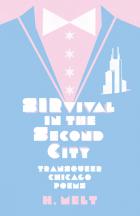| « Bookmarks | Review: Heavyweight Champion of Nothing by Zak Mucha » |
Author Mon Jul 29 2013
Poetry Review: H. Melt's SIRvival in the Second City
 Title onward, the theme of H. Melt's SIRvival in the Second City: Transqueer Chicago Poems is not subtle. This is a book that is emphatically about being trans. But it is also about being cisgender. (For the unfamiliar: this is simply the counterpart to transgender. As trans people identify as a gender other than the one assigned to them at birth, so cis people identify as the same gender the delivery-room nurse dealt them.) As Melt says in the book's introduction: "It is not public knowledge that trans people exist. And that cisgender people exist as well."
Title onward, the theme of H. Melt's SIRvival in the Second City: Transqueer Chicago Poems is not subtle. This is a book that is emphatically about being trans. But it is also about being cisgender. (For the unfamiliar: this is simply the counterpart to transgender. As trans people identify as a gender other than the one assigned to them at birth, so cis people identify as the same gender the delivery-room nurse dealt them.) As Melt says in the book's introduction: "It is not public knowledge that trans people exist. And that cisgender people exist as well."
I've chanced occasionally on a certain strain of Internet comment in which a cisgender person encounters this term for the first time and expresses deep outrage at its existence. The default state is suddenly delineated; it turns out that it has boundaries. Such commenters may feel that their gender is now subject to some unwelcome question, however tacit. What's the point of being normal if you have to think about it?
Too bad for them. Melt writes: "This book is my attempt to stare back at those who never question gender." And if such readers are ruffled by this, they may be further irked by the place from which they (Melt's preferred pronoun) stare: these very broad-shouldered streets, home of the regular guy.
The city here is neither a species of queer utopia nor an unfeeling adversary, but a place to which a young trans person might simply be native and beholden in the usual way, sometimes loving and sometimes hating it. Born at Prentice Hospital. Schooled in Evanston. Here is Millennium Park; here is the funny little second theater at the Music Box; here is the Art Institute. "We must write about ourselves. About our daily lives. About our outfits and emotions and emotional outfits . . . But we must not remain isolated within a room full of mirrors," Melt urges in an afterword to queer writers.
This means studying the frequently more hospitable spaces of art and queer culture a little critically, rather than turning to them reflexively as default havens. Melt remains engaged with the ways the city's textures impinge upon such spaces, for ill but also for good. Take the first few stanzas of "Invented Women":
breathing Black
women guard
the entrance to
roy's retrospective
galatea stands leg
less arm less face less
stomach half empty
starved by her sculptor
These "breathing Black women" took a second of my breath. As indeed they might in an actual gallery visit: installed in the background but suddenly foregrounded, lusciously three-dimensional in a sterile space.
They aren't stick figures, certainly. But they are simply drawn; the rhetoric here and throughout needs little decoding. This is a book anxious to be understood. It has footnotes naming its allusions. It has explanatory quotations. And this continual spilling over into the explicit can be a strength. Many of the nicest bits come when Melt simply excerpts the artifacts of their past. In what seems to be an oral history taken down from Melt's mother (Studs Terkel is cited), we get this crescendo of a monologue:
He gave me a ride to the airport
and we exchanged business cards and I asked if I could buy him a drink and I was
headed out for a month and I got back and I called his office and I called his office
his secretary his secretary said he's out of town out of town I called his office
one last time he called me at home
we got married and we got pregnant
your father wanted to live in the suburbs
and he wants to die there
too.
If Chicago's in need of its own Molly Bloom, this one will do.
Other repurposed artifacts show a grimmer sense of humor, such as a letter beseeching Melt to fill out a suicide-prevention survey even as it misgenders them. Photocopied forms of ID also march through the pages, tracking the merging of the former Hannah Melton into H. Melt. As this happens the narrative moves from a child's trips into the city to a queer young-adult experience, with stops at Dyke March and Beauty Bar and Big Chicks. The latter finds Melt and a friend arriving on Bear Night, and on the one hand there's "Mapplethorpe /Flirting with Dawoud Bey / Flirting with President Obama / Flirting with Every Body " on the walls; on the other, there's the sense of being isolated from the dudes who piss in the alley, and the reminder that "we usually only come / on our designated nights."
Clearly, many bridges remain unbuilt, within the queer community and in the city at large. Melt's collage of a Chicago trans experience should take on archival resonance in the decades to come, marking how far we have or haven't progressed. In the meantime, at 36 pages and seven bucks, it opens an accessible window onto an experience that's more bound up with the everyday city than it might at first appear.









